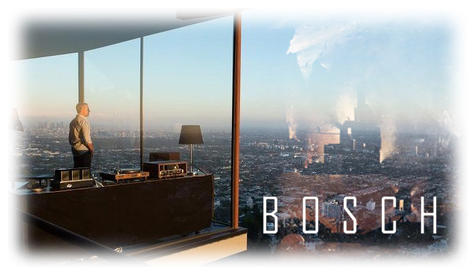
At the end of the first season of Bosch (Amazon Studios, based on the novels of Michael Connelly), we saw the main character—Hieronymus “Harry” Bosch (Titus Welliver)—staring out the window of his home at the fringe of Los Angeles, a city that he attempts to serve as a police detective. What the character may be thinking is a matter for debate and cause for speculation about the second season.
 The opening sequence shows views of LA mirrored against themselves. As the first season progressed, this artistic approach, along with the main character being named for the famous Flemish Primitive painter, suggested something allegorical. The most famous piece from the artist Bosch is “The Garden of Earthly Delights,” a triptych portraying and satirizing human nature and the human condition.
The opening sequence shows views of LA mirrored against themselves. As the first season progressed, this artistic approach, along with the main character being named for the famous Flemish Primitive painter, suggested something allegorical. The most famous piece from the artist Bosch is “The Garden of Earthly Delights,” a triptych portraying and satirizing human nature and the human condition.

Oddly enough, a band named “Caught A Ghost” performs the theme song, “Can’t Let Go.” The artistry and coincidence of the band’s name combine to perfectly recapitulate the series.
Harry Bosch is brashly tenacious to the point of being stubborn, while nearly literally being a haunted man. The deliberate choice for mirror images, the dominant lyrics, and the source of the series title are not a subliminal primer for how to watch the show. In just one minute, all of these factors in conjunction give us an incredible amount of data for what we’re about to experience.
The TV series Bosch is perhaps more subtle than the painting or the song, but it echoes a degree of the symbolism found within the artwork and heavily implied by the theme. Harry shares a world with living signposts such as Grace Billets (Amy Aquino) and Julia Brasher (Annie Wersching), whose names are metaphors for what Bosch seeks or indicate potential companions on similar quests.
The painting and series both concern choices and the confrontation of monsters—sometimes, quite literally, personal demons. Many, if not all, of the show’s choices in meta-messaging may be being made by Connelly himself, who is one of the executive producers. Some of these were intentional in the novel series, and they’re maintained and expanded in the dramatization.
Portrayed by Titus Welliver, the titular character is able to control himself only to the extent that he is skilled at solving crime. Detective Bosch knows he must learn to control his passions, his relationships, and his career. Certainly all the people in his life provide and repeat these messages to him in one way or another. Even his foe in the first season—Raynard Waits (Jason Gedrick)—warns him of the monster he could become.
Artistic choice and symbolism can probably serve as guides for Season Two. The meaning of the final scene from last year will very likely be the theme of the next episodes.
Is Detective Bosch, when he looks at the grand view outside his window, looking at Heaven or Hell from his namesake’s best-known work?
This is very likely to be the central question going forward. Is Harry a man in charge of himself and his destiny, or will he waste away into a kind of living ghost?
Waits is not the only character who serves as a distorted mirror for Harry. Only his daughter Maddie (Madison Lintz) is an exception here; she embodies and preserves some aspect of better times and hope. She’s also a symbol of the future, as her father seeks to understand his past.
The surname of Maddie’s mother—Bosch’s ex-wife’s—is Wish, which serves to play up the irony while taunting the central character. We’ve seen Maddie discover the case files of her grandmother’s murder. We may see her declare her intentions to follow in her father’s footsteps in law enforcement. There is additional contrast as Harry may be forced away from his own career.
At work, the situation could probably not be more tense and complicated for Harry. He’s certainly going to be facing disciplinary action, if not removal, from the police force. Stress may cause Harry to be formally sent for counseling, even though he’s surrounded by a Greek chorus indicating what should be his objective—if not the necessary path.
Journalist Nate Tyler (Adam O'Byrne) is the loudest voice in said chorus, and is nearly a crime scene personified, in a sense—a specific, single scene the police revisit much more often than comparable locations in most other cop shows. Tyler also unintentionally sets the stage for Bosch to reexamine his most central pain.
What makes Harry tick is the murder of his mother. He’ll be forced to explore this, whether he can solve the crime or not. As he’s confronted with the mysteries of his origin and motivation, he will quite probably be mirrored by someone who is, at least outwardly, much more certain of the world and their place in it.
Then there is Irvin Irving (Lance Reddick), an ambitious man who sees Detective Bosch as a useful tool and convenient scapegoat. The deputy chief has his own blindness when it comes to reading the signposts that also surround him. Part of Bosch’s well-known reputation is his talented mind and his misbehavior. When—not if—Harry discovers Irving’s puppet master tendencies, he’ll break the rules to break the strings.
Bosch is a deeply haunted and flawed man. Waits was delusional, but not about the similarities he and Harry shared. Bosch is unstable and has difficulty controlling himself, his relationship, and his career. He is in control of himself only enough to be good at solving crime.
Bosch is a show about binary choice and contrast. It makes its points through distortion and variation. If Detective Bosch’s vantage point from his home makes him feel like he’s on the outside looking in, will he try to move closer to others in his world or will he grow more cocooned in his fortress of solitude? Season 2 will show us which side of the triptych Harry finds most compelling. The series may on the surface be a crime drama, but it might be much more existential than that.
Either way, the clues are there.
Thom Truelove is the co-founder of Psych Wing (a group developing short films set primarily in the sci fi genre) and a collaborating partner on future sci fi/fantasy novels with gothic Victorian fantasy author Leanna Renee Hieber (Tor Books).
As an essayist, his work has been picked up by such anthologies as the forthcoming “The Book of Starry Wisdom: Apocrypha of Lovecraft's Cthulhu” (edited and produced by Simon Berman). You are invited to visit Thom's blog, “Surfing the Zeitgeist” at thomtruelove.com.
